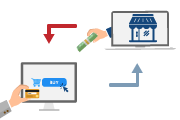If there is one thing we can affirm with great conviction, it is that Brazilian ecommerce is unique. In addition to specific payment methods, a high volume of mobile sales and expressive annual growth, the digital consumer also acts in particular ways. Online customers in Brazil do a great amount of research to find the best deals online, are very resistant to shipping costs and easily give up on a purchase if the preferred payment method isn’t available at checkout.
If the Brazilian consumer has his own characteristics, we wouldn’t expect any different from the Brazilian fraudster.
This is why at PagBrasil, where we focus exclusively on processing payments for the Brazilian market, we deeply value the importance of partnering with an antifraud solution developed for the nuances of the local market. Founded in 2014, Konduto works with innovative technology that analyses the consumer’s behavior to fight fraud.
“Offering an antifraud solution developed for the Brazilian market that puts together artificial intelligence and traditional risk analysis techniques is essential to providing secure transactions for our clients” – Ralf Germer, CEO and cofounder
Cofounder of Konduto, Tom Canabarro, has shared with us a bit of the story of the company that, just last year, analyzed over 175 million orders.
The beginning
One of the things that drives businesses to success is seeking a solution that tackles a specific problem – and, in this case, it was no different.
“Konduto began after discomfort with an imported antifraud solution from the United States that the company I worked with at the time used. The system was entirely based on conditionals that determined if the order was approved or not and delivered unsatisfactory results. I spoke about these problems with Milton Tavares Neto, a computer engineer and my longtime friend, and we started working on a risk analysis system that, to us, would sound like a more efficient solution for the market”, Canabarro recalled.
After seven months of development and another four of testing, we launched the first antifraud solution to monitor the user’s navigating behavior from the moment he accesses a website to complete a purchase. Based on artificial intelligence, Konduto’s system is able to, for instance, detect how much time the user spent on each page, if he copied or typed in the card’s data, if he’s viewed one or more products, among many other actions that help identify if the order is fraudulent or not.
Konduto’s machine learning also uses traditional validation techniques, such as personal data and glocalization. In under one second, the system is able to analyze over 2,000 variables to calculate the risk of a particular transaction.
“Reviewing an order based merely on name, CPF and e-mail address hasn’t been enough for a very long time” – Tom Canabarro, cofounder of Konduto
Delivering a solution to the market
If the subject “fraud” is already delicate enough, imagine trusting your business’s risk management to a company that has just been launched in the market. This was the first big challenge Konduto faced: gaining trust.
“We offered free services to two merchants and asked them for a review in exchange. Those were tough months until we received the first investment round.”
In wasn’t until October 2015, when Konduto received the first investment round, that the company was able to add more people to the team that, until then, was composed of only five. Today, the company has over 100 employees.
The future of fraud
In a country that leads the number of cybercrime occurrences and has a large volume of scams such as phishing and credit card testing, selling to Brazil without an antifraud solution is not possible. And yet, completely nullifying fraud events is, to the frustration of merchants, impracticable.
“An antifraudster is like a goalkeeper. If he does all his defenses, he hasn’t done more than his job. But if he misses, people will talk about him for a week…” jokes Canabarro.
Like with payment methods, frauds are constantly evolving. Even with advanced machine learning systems and artificial intelligence, facing fraud is a constant challenge.
“As payment methods evolve, criminals also find ways to deceive the system. They will always go where the money goes.”
Working with a complete payment platform is, according to Canabarro, a fundamental tool for facing fraud. “Konduto’s system has evolved and continues evolving, thanks to the order analysis of clients from multiple segments such as the ones that comprehend PagBrasil’s portfolio, in addition to the large range of payment methods the platform offers to the user,” said the entrepreneur.
In order to reduce fraud effects, one of the solutions is to prepare ahead and stay aware of the possible “trends.” Account takeover is one of them – mostly due to data leakage on a large scale. According to Canabarro, new authentication forms and 3DS2.0 are topics that we will hear plenty about when it comes to fighting fraud.
Fraud Day: the first event on fraud prevention
On March 5th, Konduto will be hosting the second edition of Fraud Day, the first event focused on fraud prevention. Canabarro says the idea of promoting an event specifically for this subject came up after realizing the public’s interest in content on the segment after joining events about ecommerce and payment methods. It was then, in 2019, that Konduto, with the support of Emailage, organized the first event for professionals working with digital payment risk. The event exceeded expectations and 200 people joined. “On March 5th, we will bring together 350 people in one more edition that will most definitely interest the risk analysis market,” adds Canabarro.
Our CEO and cofounder Ralf Germer will be one of the speakers at the second edition of Fraud Day, with the topic: “From carbon paper to the smartphones screen: how did payment methods evolve among fraudsters?” The panel will begin at 10:55am. Join us!



